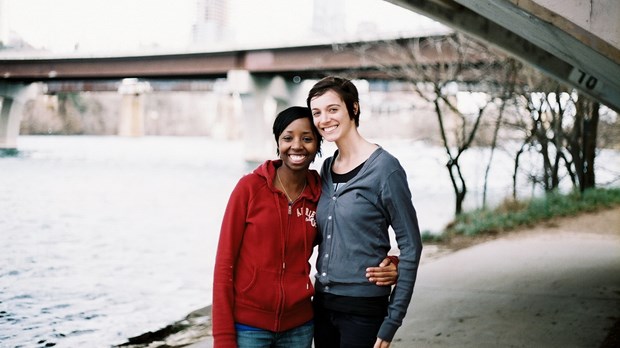The Color of Friendship

LISA AND I seldom interrupt our morning walk to "pig out," but on this particular day I feel more like eating than exercising. So when Lisa calls, I suggest we get some fried okra and collard greens at one of her favorite places to eat, a soul-food restaurant in the inner city.
As we stand at the door of this crowded little restaurant, waiting for a table, it's hard for me to believe I have a white friend who's comfortable in an all-black setting. We're both keenly aware Lisa's is the only white face in a crowd of African Americans. When we finally get a table, our waitress has a rotten attitude. She smiles as she waits on other tables, but whenever she approaches our table, her cheerful disposition turns cold. Poor service accompanies her negative attitude. We repeatedly ask for glasses of water. We never receive butter for our cornbread. With each request, our African-American waitress becomes increasingly irritated.
"This is reverse discrimination," I say to Lisa. "We African Americans know how it feels to be treated like this. Why would we treat others the same way?"
ALTHOUGH I ASK THE QUESTION, I understand the answer too well. I, too, could easily play the "let's hurt white people like they've hurt us" game. When I was in kindergarten, a little freckled-faced white girl named Penny called me a "nigger." Penny's remark proved to be only the first of many derogatory names and behaviors I've endured from members of the white race.
Not long ago, an all-white church board hesitated to hire me for a job in their counseling center because of my color, despite the fact that my qualifications fit the job perfectly. I've been told not to wear my hair in braids or wear African-type clothing or head wraps if I want to be more successful. I've encountered enough racial incidents and innuendoes to keep me entrapped by anger and bitterness for a lifetime.
I carry a sign inside my heart that reads, "Go away, white people. Just leave me alone." But God's made it clear he wants me to take the sign down. Every now and then he sends me a special white friend like Lisa Sinclair who helps me chip away at the racial barriers in my relationships.
Lisa and I met many years ago at a women's retreat. At the time, my family and I were facing a major crisis. The church my husband pastored had asked him to resign. In four short months, my husband had to find another job and we needed to secure another place to live. Lisa's husband works with pastors in the city and they both were familiar with our situation.
After Lisa and I were introduced, she said something like, "I don't like what that church is doing to you. I just want you to know that. I don't like it one bit." Then she walked away.
I thought, Now there's an interesting person. She doesn't even know me and she's identifying with my situation. I felt as though Lisa cared about us as hurting people.
From that point on, it seemed as if Lisa and I were always bumping into each other at various church functions, although we attend different churches. Our conversations took place while we rushed from one place to the next. In two minutes or less we exchanged our concerns, struggles, and usually a prayer request. I appreciated Lisa's straightforwardness and honesty. I never sensed from her a "let me tell you how to get your life together" attitude. Our brief conversations usually concluded with a promise to get together.
I once mentioned to Lisa, "When I walk in the morning, I pass by your house." Not long after that conversation, Lisa joined my morning walking routine. That was the start of our walking, talking, and praying friendship.
DURING our morning exertions, Lisa and I talk honestly about how our husbands sometimes "get on our nerves." We confess our fears about our children. We listen to each others' dreams and discuss a myriad of things we both want to accomplish before we die. We complain about our messy offices, which often reflect our disorganized lives.
We also share experiences that enhance our friendship. Lisa's a family nurse practitioner at a homeless clinic. I'm a freelance writer and Bible study teacher who takes classes toward my masters degree in religious education when time and money allow. Lisa also has an interest in writing and has worked as a missionary in Africa. She still travels there for special short-term ministry assignments. One of my deepest desires is to go to Africa, so every time Lisa returns from one of her missionary trips, I remind her, "You can't keep going to Africa without me."
Lisa and I feel safe with each other, free enough to express our times of anger with God, our bouts with depression and loneliness, our nagging desire to just give up and quit. Because of our common struggles, we're able to encourage each other.
This openness crosses over into the racial area. All of us, whether we're willing to admit it or not, harbor stereotypes and unfair assumptions about people of different races. Lisa and I force ourselves to talk about issues, no matter how painful they might be.
Lisa opens her home to African-American foster children and teenagers. She's committed to working and helping in the inner city. Although I appreciate Lisa and the others whom God uses to help with some of the problems in the black community, it's still hard for me to accept their assistance. I wish black people could solve their dilemmas without intervention from any other race. God, however, has made it clear to me that he recruits people from every race to accomplish his will. And if things in the African-American community are going to improve, it's going to take people such as Lisa, who assist from the outside, whether it makes us feel uncomfortable or not.
Lisa and I had a painful yet insightful conversation about her African-American foster child, Terry. When Terry is with his black family, he watches TV and gets little attention. But when he's with Lisa's family, who has more advantages and resources, he gets individual attention and more opportunities to try new activities. "Is Terry going to grow up thinking everything white is good, and everything black is not?" I asked Lisa one morning.
This question deeply hurt Lisa. "Vikki, don't you think I've struggled with that?" She started to wipe her tears with the sleeve of her sweatsuit. "What are white people supposed to do?" Lisa's concern was just the opposite of mine. "I don't want Terry to grow up believing everyone white is bad," she told me later.
When this discussion first came up, my tendency was to apologize for bringing up the subject and resolve never to talk about it again. But I knew that if I did that, Lisa and I would be doing what white and African-American people have been doing for years: "sweeping things under the rug," smiling in each other's faces, politely going on as if nothing ever happened, avoiding the complicated issues. Lisa and I both knew we were too far into the friendship for that kind of nonsense.
We expressed some strong opinions about African-American children in white foster homes. We confessed our confusion and anger, then took our feelings and concerns to our heavenly Father. We prayed for each other, for Terry, and for the wrongs in both our races. I sensed God bringing not necessarily an answer to our question, but healing and understanding between two women who, at times, view issues differently.
There's a lot of talk these days about racial reconciliation. I regard most of it as superficial jargon. But when Lisa and I attack complicated racial issues and bring them before the Lord in prayer, I feel as though more than just talk is going on. I sense God taking my old sign down and replacing it with a new one that says, "By this all men will know that you are my disciples, if you have love for one another" (John 13:35, NASB). When Lisa and I walk together we're losing more than physical weight. We're losing some of the weight of carrying those signs inside our hearts.
VICTORIA L. JOHNSON is author of Restoring Broken Vessels (Dabar Publishing Co.). She and her family live in Wisconsin.
Image by Taylor Ward / Flickr
Read more articles that highlight writing by Christian women at ChristianityToday.com/Women
 Read These Next
Read These Next
 Entertaining AngelsOpening our homes and tables to strangers blesses both the giver and receiver.
Entertaining AngelsOpening our homes and tables to strangers blesses both the giver and receiver.
 Finding a Great Husband Doesn't Just "Happen"5 things I wish my mom had told me about dating and preparing for marriage
Finding a Great Husband Doesn't Just "Happen"5 things I wish my mom had told me about dating and preparing for marriage








 Homepage
Homepage